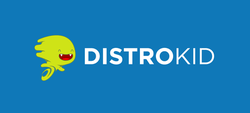DistroKid
DistroKid is an independent digital music distribution service, founded in 2013[1] by American entrepreneur Philip J. "Pud" Kaplan. DistroKid principally offers musicians and other rights-holders the opportunity to distribute and sell or stream their music through online retailers such as iTunes, Spotify, Pandora, Amazon Music, Google Play Music, Tidal, Deezer, iHeartRadio and others.
 | |
Type of site | Digital distribution |
|---|---|
| Owner | Philip J. Kaplan |
| Industry | Music |
| URL | distrokid.com |
| Launched | May 2013 |
| Current status | Active |
In July 2015, a DistroKid release by musical act Jack & Jack went to #1 worldwide in the iTunes charts.[2][3] This was particularly notable because DistroKid does not take a commission of royalties, making this the first time a #1 charting artist was able to keep 100% of their earnings.[4]
In May 2016, DistroKid launched a feature called "Teams" that makes it possible for royalties to be automatically sent to collaborators and shareholders.[5][6] Since then Distrokid has made several other developments including partnering with Spotify to support cross-platform uploads for Spotify artists who upload directly or have direct licensing deals with the company[7][8][9] and an investment from Silversmith Capital Partners.[10]
History
DistroKid was developed in 2012 by Philip J. Kaplan and launched in mid 2013.[11] It began as a side-feature of Kaplan's music social network, Fandalism,[4] and was split out into its own company in 2015.[1]
Website technology
DistroKid uses many external APIs to reduce the development work load and automate most processes.[12]
References
- "Philip Kaplan Officially Launches DistroKid, A Cheap, Efficient Way To Distribute Lots Of Music". TechCrunch.
- "How These Independent Artists Reached No. 1 On The iTunes Chart". Forbes.
- "The DistroKid Music Distribution Service Has Launched An Indie Artist To The Top Of The Charts". TechCrunch.
- "The Artist Who Has The #1 Album On iTunes Is Getting 100% Of The Royalties". Digital Music News.
- "DistroKid's music payment system now lets you send cash to everyone on a track". TechCrunch.
- "DistroKid Will Now Pay Everyone Who Worked On Your Song". TechCrunch.
- "Spotify takes a stake in DistroKid, will support cross-platform music uploads in Spotify for Artists". TechCrunch. Retrieved 2018-11-13.
- "A New Spotify Initiative Makes the Big Record Labels Nervous". Retrieved 2018-11-13.
- "Spotify will now let artists directly upload their music to the platform". The Verge. Retrieved 2018-11-13.
- "Silversmith Capital Partners' investment in DistroKid – Global Legal Chronicle". www.globallegalchronicle.com. Retrieved 2018-11-13.
- "DistroKid Launches Much Cheaper TuneCore Alternative". HypeBot.
- "CEO War: INgrooves Blasts DistroKid. DistroKid Fires Back". Digital Music News.